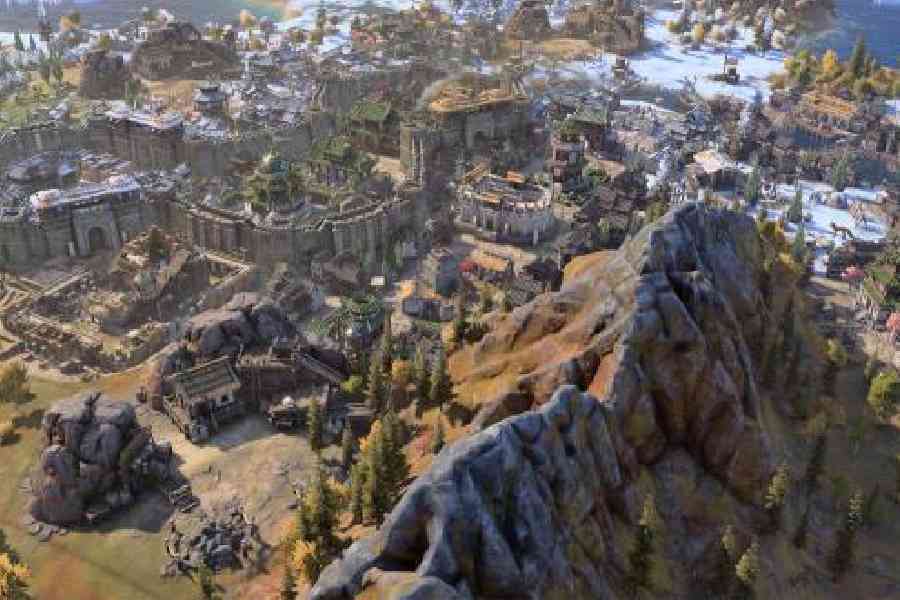Unhappiness is a dreaded condition in the Civilization game series. Unhappy citizens stop working, stop scientific pursuits and, worst of all, start rioting.
In the new Sid Meier’s Civilization VII, which introduces three historical ages and a mounting series of crises during the transitions between them, my ancient Persian empire was running smoothly and expanding with ease. Then, suddenly, things struggled to feel cohesive. The game declared that my empire had fractured “as once-loyal settlements seek their own path forward”.
The unhappiness in my cities and towns grew so severe that several outlying settlements began trashing their districts and looking to outside civilisations for support. While I worked at putting out fires started by rioters, my neighbour Napoleon swooped in and quickly conquered one of my towns. This started a territorial war that only deepened the unhappiness of my population. Soon, half my towns were in revolt.
While following your chosen civilisation’s path in the game, from the rough-hewed settlements of the past to the glistening megalopolises of the future, you move through ages that transform not just your technologies, government and civic policies, but also the broader identity of your civilisation itself.
With its precipitous rises and falls, Civilization VII is a departure for the series. Although past iterations have had revolts, diplomatic incidents and civic upset, they tend to feel less closely connected to the ways that historical forces can boil over into crisis and conflict.
The violent and chaotic cuts here accurately reflect a world history where many things can happen all at once and often with surprising swiftness. History doesn’t always move forward in the routine, turn-based lock step of the 4X genre (explore, expand, exploit, exterminate) that Civilization popularised. More often, root causes like financial instability, cultural changes and oppressive hierarchies stay below the surface until emerging in a cacophony of war, revolution and natural-disaster-fuelled chaos.
It feels appropriate to be playing this game at this point in America’s history. The coronavirus pandemic was an event of immense disruption. The whole planet came to a standstill; many industries foundered and either transformed completely or disappeared. At the same time, we had a leader in President Donald Trump who could compound the feelings of disorientation. We are a divided and an unhappy nation, and it’s difficult to know where to go from here.
It’s in states of disorientation that societies can see change that appears to happen overnight. What seemed impossible during periods of greater stability can now be pushed through.
Those who pick up Civilization VII will be buffeted by these sorts of crisis scenarios, as well as by increasingly violent environmental catastrophes like flooding rivers and erupting volcanoes. It’s easy to see why dramatic political change can result.
It took a hurricane in New Orleans for real estate conglomerates to condemn many of the housing units once occupied by poor residents. It took a tsunami in Sri Lanka for its tourism industry to kick out the fishing villagers. The end of the Soviet Union brought precipitous economic collapse.
Civilization VII evokes the dynamics of these historical moments through its gameplay. The identity of your starting civilisation — Aksum, Egypt, Khmer, Maya, Rome, etc. — cannot shift from one age to the next without disruption, without an often overwhelming amount of chaos that threatens to bring everything crashing down.
In the game’s first age, antiquity, you establish cities and towns and map out the geography of your starting continent. Once you have a nascent empire — spreading out a bit, meeting a few other civilisations and discovering the oceanic borders of your land mass — the game moves into the exploration age, which introduces seafaring, colonisation and religious proselytising. The final age is the modern one, with the world now mostly settled and divided up, its borders more sharply defined and ossified.
In my play-through as the Persian empire, surviving into the exploration age automatically quelled the uprisings. I managed to ride out the threatening rise of the mercantile class and the bourgeoisie, wrap up the exploration age, and make it a few turns into the modern age, only to have war declared on me by several civilisations at once.
During the catastrophic transitions, it’s easy to lose hope, to drift unsure into a dissociated doomerism. But persevering in the face of disaster usually means making it out to the other side, eventually. The civilisation that makes it out of a crisis often won’t look anything like the one that went in.
NYTNS










